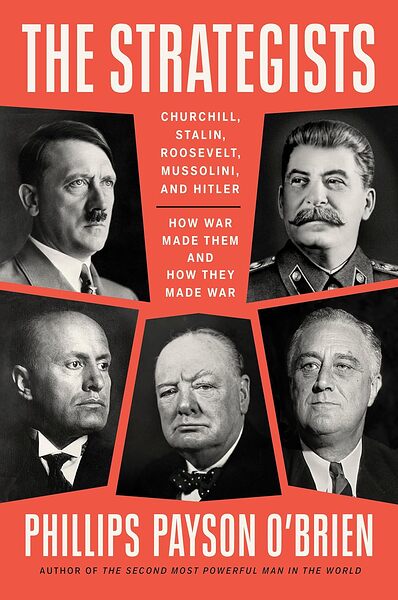Looking for a good read? Here is a recommendation. I have an unusual approach to reviewing books. I review books I feel merit a review. Each review is an opportunity to recommend a book. If I do not think a book is worth reading, I find another book to review. You do not have to agree with everything every author has written (I do not), but the fiction I review is entertaining (and often thought-provoking) and the non-fiction contain ideas worth reading.
Book Review
A Look at the Leaders
Reviewed by Mark Lardas
September 1, 2024
“The Strategists: Churchill, Stalin, Roosevelt, Mussolini, and Hitler–How War Made Them and How They Made War,” by Phillips Payson O’Brien, Dutton, August, 2024, 544 pages, $35.00 (Hardcover), $14.99 (e-book), $24.75 (Audiobook)
More than any others, five men directed the flow and determined the outcome of World War II: Winston Churchill. Adolf Hitler. Joseph Stalin. Benito Mussolini, and Franklin Roosevelt. Understanding how and why World War II evolved as it did requires understanding these five.
“The Strategists: Churchill, Stalin, Roosevelt, Mussolini, and Hitler–How War Made Them and How They Made War,” by Phillips Payson O’Brien, examines these men. It shows how their early life experiences shaped them and how they subsequently shaped World War II.
O’Brien splits the book. The first half spends ten chapters on the early lives of these men. He devotes a chapter to each man’s early life, showing how they grew to adulthood, and what influences worked on them. Roosevelt and Churchill grew up privileged, raised to take the reins of power as adults. Hitler, the son of a petty bureaucrat, rebelled against the expectation he follow the same path. Mussolini and Stalin grew up in poverty, with brutal fathers and adoring mothers.
The following five chapters examine each man’s experiences in the years leading up to and during the First World War (and for Stalin the Russian Civil War). O’Brien shows how each man’s experiences during that war forged the beliefs that drove them during World War II.
Roosevelt and Churchill came away convinced high technology weapons could reduce soldier casualties – trading oil for blood. Mussolini’s was convinced that “spirit” could carry Italy to victory. Hitler believed victory lay in German superiority, especially in terms of bigger and better weapons. Stalin learned to trust no one except those absolutely loyal to him, particularly those from his own peasant class. Killing potential rivals before they threatened you was the key to success.
O’Brien devotes the last half of the book showing how these beliefs informed the actions of all five during World War II. He also shows how they led each leader to success and victory or defeat and ignominy. Unsurprisingly Mussolini is shown as the least successful, followed by Hitler. Surprisingly Stalin is revealed as the most successful, followed Roosevelt and then Churchill.
“The Strategists” offers a new, thought-provoking view of World War II and its leaders. O’Brien presents the war as driven by the highly personal decisions of five men, rather than the result of the impersonal tides of history and technology. He shows how these tides were started and steered by these five.
Mark Lardas, an engineer, freelance writer, historian, and model-maker, lives in League City. His website is marklardas.com
